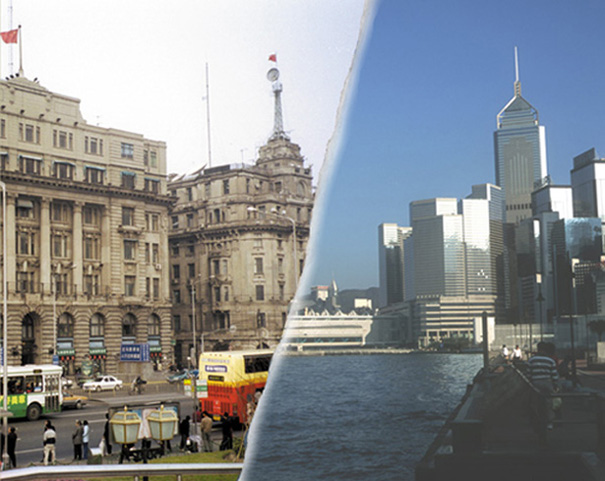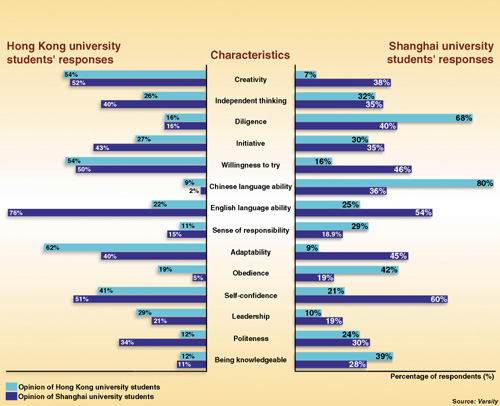|
Of the economic
rivals Hong Kong and Shanghai, which one will outdo the other remains
a concern.
Aside from
mere economic comparisons, the quality of univesity students in
the two cities is also an important point of reference in comparing
the two cities.
While Hong
Kong students are sitting back enjoying themselves, Shanghai students
are drilling hard to take the lead.
A survey
done by Varsity has shown how university students see each other
and themselves in the two cities.
From the
survey, Shanghai students think the top five abilities that Hong
Kong university students have are English language skills, creativitiy,
self-confidence, willingness to try, and initiative, with English
language ability topping the list.
About 76 percent
of Shanghai students think that Hong Kong students have good English,
but only 22 percent of Hong Kong students agree.
Alfred Zhu,
an exchange student at City University of Hong Kong, was formerly
a Shanghai Jiao Tong University student.
He disagrees
that Hong Kong university students have good English.
“My professor
said, ‘It was over a century that Hong Kong was under British rule,
but the English level of Hong Kong people is still that poor.’”
There seems
to be no consensus on the English proficiency of Hong Kong students,
but it is generally agreed that Hong Kong students are weak in Chinese.
Only 9 percent
of Hong Kong students think they are good in Chinese, and only 2
percent of Shanghai students agree.
This poses
a threat to Hong Kong’s competitiveness in the near future.
Prof. James
Xie and Prof. Jamie Jia are associate professors, respectively,
in the Department of Accountancy and Department of Marketing at
the Chinese University.
Both said
Shanghai students are active learners, since opportunites for matriculation
are more precious in China.
In China,
there are only 1.6 million university students out of a total population
of 1.3 billion.
Thus, students
admitted to top universities must have excellent performance.
According
to Prof. Xie, there are few scholarships in China. Students on the
mainland have to solve their financial problems by themselves.
Said Prof.
Jia: “Most Shanghai students want to study abroad, so they are highly
motivated and study hard for a degree.
“But Hong
Kong students only want a job and focus on the knowledge required
for their desired career.
“They don’t
mind their grades and they don’t know what they study for.”
The survey
shows Hong Kong students have other insufficiencies, too.
Only 11 percent
and 12 percent of Hong Kong students think they have a sense of
responsibility and politeness, respectively, and 15 percent and
34 percent of Shanghai students agree, respectively.
Prof. Edmond
I. Ko, vice-president of education and dean of students at City
University of Hong Kong, does not agree that Hong Kong students
are worse than Shanghai students.
Prof. Ko
said top students in Hong Kong are as competent academically as
the Shanghai exchange students.
Said he:
“As we now have more students, the average standard of students
has dropped.
“But the quality
of top students remains the same.
“There is
no point in saying Hong Kong students not as good as Shanghai students.”
Nevertheless,
Prof. Ko said Hong Kong students do show lower competence in some
ways.
“Most Hong
Kong students are uncertain about their future. And they seldom
strive for improvement,” he said.
On the contrary,
60 percent of Shanghai students have self-confidence.
Nearly half
of the Shanghai respondents think that they have initiative, a sense
of responsibility and independent thinking.
With these
differences, Hong Kong students have to improve themselves so as
to maintain their competitiveness.
Chief Executive
Tung Chee Hwa announced in his 2000 policy address that the government
planned to develop Hong Kong’s higher education.
But the percentage
of expenditures on tertiary education, with reference to the total
expenditure on education, has dropped for 2 consecutive fiscal years.
Prof. Ko
said he is still confident about his students.
Said he: “I
believe our students can compete with others. Hong Kong tertiary
education is effective in nurturing professionals to keep Hong Kong’s
competitiveness.”
Compared with
Shanghai, Prof. Xie said Hong Kong’s educational funding is more
than that of Shanghai, thus providing more resources like libraries
and laboratories.
Said Prof.
Jia: “The Chinese government actually did not invest much in higher
education until recent years. And the investments usually go to
key universities.”
Shanghai Jiao
Tong University and Fudan University are two of the best universities
in Shanghai.
Take the
facilities in computer science departments in Fudan University and
the Hong Kong University of Science and Technology as examples.
The latter
provides about 200 more workstations in computer laboratories.
With more
educational funding, Prof. Xie said Hong Kong universities also
have better faculty members.
Said Prof.
Jia: “Hong Kong has more professors with Ph.D.s from overseas than
China does, thus providing better courses.”
However,
even if Hong Kong has better facilities, Hong Kong may still be
outranked if students are unaware of the potential challenge from
Shanghai.
According
to a report in Time magazine on 11 December 2000, foreign investors
poured $27.7 billion into Shanghai in the past 10 years.
In that period,
Shanghai’s GDP has grown at an average of 10 percent a year, compared
with 3.7 percent average growth for Hong Kong.
The GDP of
Hong Kong in 1999 was HK$1,230.4 billion. That of Shanghai was RMB
403.5 billion.
In the coming
decade, the predicted growth rate of GDP in Hong Kong and Shanghai
are 4 percent and 10 percent, respectively.
Mr. Yao Xi-tang,
president of Pudong Academy of Development in Shanghai, said Shanghai’s
GDP would surpass that of Hong Kong by 2010.
However, Prof.
Steven Cheung of the Department of Economics and Finance at City
University of Hong Kong disagrees.
“GDP reflects
the general living standard, and it depends on various factors.
Such prediction is not grounded,” he said. 
...
|
 Online
Edition
Online
Edition 
